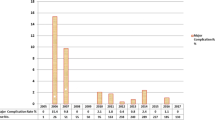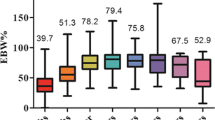Abstract
Background
Laparoscopic sleeve gastrectomy (LSG) is emerging as a popular “stand-alone” bariatric procedure. We report our 5 years experience with LSG as a single-stage bariatric procedure with which to study the technical progress, learning curve, complications, and follow-up results.
Methods
Prospectively collected data of 228 patients (145 females and 83 males), who underwent LSG for morbid obesity, from February 2007 to March 2012, was retrospectively analyzed.
Results
The mean age was 34.68 years (range, 18–62 years) and the mean preoperative body mass index (BMI) was 37.42 ± 4.75 kg/m2 (range, 32.08–65.69 kg/m2). Mean operative time was 60.63 ± 27.37 min. The mean BMI decreased to 26.15 ± 3.71 kg/m2 at 3 years (p < 0.001) and to 27.94 ± 4.08 kg/m2 at 5 years (p < 0.001). Mean percentage excess weight loss was 71.96 ± 21.30 % at 3 years and 63.71 ± 20.08 % at 5 years. The 30-day readmission rate was 3.07 %.Overall complication rate was 4.3 %, including strictures, leaks, peritonitis, gastrocutaneous fistula, and one (0.43 %) mortality. One patient with weight regain and another with stricture underwent conversion to Roux-en-Y gastric bypass. Complication rates significantly decreased after the first 50 cases (p = 0.022), suggesting an initial learning curve. Resolution of diabetes, hypertension, and hyperlipidemia was 66.67, 100, and 50 %, respectively, at 5 years.
Conclusions
LSG as a single-stage bariatric procedure is safe and durable, achieving weight loss and resolution of comorbidities up to 5 years. Adherence to technical details is pivotal in reducing complications associated with the initial learning phase.



Similar content being viewed by others
References
Lakdawala MA, Bhasker A, Mulchandani D, et al. Comparison between the results of laparoscopic sleeve gastrectomy and laparoscopic Roux-en-Y gastric bypass in the Indian population: a retrospective 1 year study. Obes Surg. 2010;20(1):1–6.
Himpens J, Dapri G, Cadiere GB. A prospective randomized study between laparoscopic gastric banding and laparoscopic isolated sleeve gastrectomy: results after 1 and 3 years. Obes Surg. 2006;16:1450–6.
Hess DS, Hess DW. Biliopancreatic diversion with a duodenal switch. Obes Surg. 1998;8:267–82.
Regan JP, Inabnet WB, Gagner M, et al. Early experience with two-stage laparoscopic Roux-en-Y gastric bypass as an alternative in the super-super obese patient. Obes Surg. 2003;13(6):861–4.
Chu CA, Gagner M, Quinn T, et al. Two-stage laparoscopic biliopancreatic diversion with duodenal switch: an alternative approach to super-super morbid obesity (abstract). Surg Endosc. 2002;16:S069.
Sammour T, Hill AG, Singh P, et al. Laparoscopic sleeve gastrectomy as a single-stage bariatric procedure. Obes Surg. 2010;20(3):271–5.
Baltasar A, Serra C, Pérez N, et al. Laparoscopic sleeve gastrectomy: a multi-purpose bariatric operation. Obes Surg. 2005;15(8):1124–8.
Akkary E, Duffy A, Bell R. Deciphering the sleeve: technique, indications, efficacy, and safety of sleeve gastrectomy. Obes Surg. 2008;18:1323–9.
Lee WJ, Wang W. Bariatric surgery: Asia-Pacific perspective. Obes Surg. 2005;15:751–7.
Mechanick JI, Kushner RF, Sugerman HJ, et al. American Association of Clinical Endocrinologists, The Obesity Society, and American Society for Metabolic & Bariatric Surgery Medical Guidelines for Clinical Practice for the Perioperative Nutritional, Metabolic, and Nonsurgical Support of the Bariatric Surgery Patient. Surg Obes Relat Dis. 2008;4(Supp):109–84. doi:10.1016/j.soard.2008.08.009.
Trelles N, Gagner M. Updated review of sleeve gastrectomy. The Open Gastroenterol J. 2008;2:41–9.
Vidal J, Ibarzabal A, Romero F, et al. Type 2 diabetes mellitus and the metabolic syndrome following sleeve gastrectomy in severely obese subjects. Obes Surg. 2008;18:1077–82.
Sarela AI, Dexter SP, O'Kane M, et al. Long-term follow-up after laparoscopic sleeve gastrectomy: 8–9-year results. Surg Obes Relat Dis. 2011;8:679–84.
Himpens J, Dobbeleir J, Peeters G. Long-term results of laparoscopic sleeve gastrectomy for obesity. Ann Surg. 2010;252:319–24.
Prasad P, Tantia O, Patle N, et al. An analysis of 1–3-year follow-up results of laparoscopic sleeve gastrectomy: an Indian perspective. Obes Surg. 2012;22(3):507–14.
Chowbey PK, Dhawan K, Khullar R, et al. Laparoscopic sleeve gastrectomy: an Indian experience—surgical technique and early result. Obes Surg. 2010;20:1340–7.
Deitel M, Gagner M, Erickson AL, et al. Third International Summit: current status of sleeve gastrectomy. Surg Obes Relat Dis. 2011;7(6):749–59.
Lee WJ, Chong K, Ser KH, et al. Gastric bypass vs. sleeve gastrectomy for type 2 diabetes mellitus: a randomized, controlled trial. Arch Surg. 2011;146:143–8.
Todkar JS, Shah SS, Shah PS, et al. Long-term effects of laparoscopic sleeve gastrectomy in morbidly obese subjects with type 2 diabetes mellitus. Surg Obes Relat Dis. 2010;6:142–5.
Gill RS, Birch DW, Shi X, et al. Sleeve gastrectomy and type 2 diabetes mellitus: a systematic review. Surg Obes Relat Dis. 2010;6:707–13.
Kiong KL, Ganesh R, Cheng AK, et al. Early improvement in type 2 diabetes mellitus post Roux-en-Y gastric bypass in Asian patients. Singap Med J. 2010;51:937–43.
Nocca D, Guillaume F, Noel P, et al. Impact of laparoscopic sleeve gastrectomy and laparoscopic gastric bypass on HbA1c blood level and pharmacological treatment of type 2 diabetes mellitus in severe or morbidly obese patients. Results of a multicenter prospective study at 1 year. Obes Surg. 2011;21:738–43.
Rosenthal R, Li X, Samuel S, et al. Effect of sleeve gastrectomy on patients with diabetes mellitus. Surg Obes Relat Dis. 2009;5:429–34.
Melissas J, Koukouraki S, Askoxylakis J, et al. Sleeve gastrectomy: a restrictive procedure? Obes Surg. 2007;17:57–62.
Pereferrer FS, Gonzàlez MH, Rovira AF, et al. Influence of sleeve gastrectomy on several experimental models of obesity: metabolic and hormonal implications. Obes Surg. 2008;18:97–108.
Mason EE. The mechanisms of surgical treatment of type 2 diabetes. Obes Surg. 2005;15:459–61.
Rubino F, Forgione A, Cummings DE, et al. The mechanism of diabetes control after gastrointestinal bypass surgery reveals a role of the proximal small intestine in the pathophysiology of type 2 diabetes. Ann Surg. 2006;244:741–9.
Murphy KG, Bloom SR. Gut hormones and the regulation of energy homeostasis. Nature. 2006;444:854–9.
Karamanakos SN, Vagenas K, Kalfarentzos F, et al. Weight loss, appetite suppression, and changes in fasting and postprandial ghrelin and peptide-YY levels after Roux-en-Y gastric bypass and sleeve gastrectomy: a prospective, double blind study. Ann Surg. 2008;247:401–7.
Shi X, Karmali S, Sharma AM, et al. A review of laparoscopic sleeve gastrectomy for morbid obesity. Obes Surg. 2010;20(8):1171–7.
Rosenthal RJ et al. International Sleeve Gastrectomy Expert Panel Consensus Statement: best practice guidelines based on experience of >12,000 cases. Surg Obes Relat Dis. 2012;8(1):8–19.
Fuks D, Verhaeghe P, Brehant O, et al. Results of laparoscopic sleeve gastrectomy: a prospective study in 135 patients with morbid obesity. Surgery. 2009;145(1):106–13.
Langer FB, Shakeri-Leidenmühler S, Bohdjalian A, et al. Strategies for weight regain after sleeve gastrectomy. Surg Laparosc Endosc Percutan Tech. 2010;20(3):159–61.
Iannelli A, Schneck AS, Noel P, et al. Re-sleeve gastrectomy for failed laparoscopic sleeve gastrectomy: a feasibility study. Obes Surg. 2011;21(7):832–5.
Dapri G, Cadière GB, Himpens J. Laparoscopic repeat sleeve gastrectomy versus duodenal switch after isolated sleeve gastrectomy for obesity. Surg Obes Relat Dis. 2011;7(1):38–43.
Lacy A, Ibarzabal A, Pando E, et al. Revisional surgery after sleeve gastrectomy. Surg Laparosc Endosc Percutan Tech. 2010;20(5):351–6.
Karcz WK, Marjanovic G, Grueneberger J, et al. Banded sleeve gastrectomy using the GaBP ring—surgical technique. Obes Facts. 2011;4(1):77–80.
D'Hondt M, Vanneste S, Pottel H, et al. Laparoscopic sleeve gastrectomy as a single-stage procedure for the treatment of morbid obesity and the resulting quality of life, resolution of comorbidities, food tolerance, and 6-year weight loss. Surg Endosc. 2011;25:2498–504.
Weiner RA, Weiner S, Pomhoff I, et al. Laparoscopic sleeve gastrectomy—influence of sleeve size and resected gastric volume. Obes Surg. 2007;17:1297–305.
Bohdjalian A, Langer FB, Shakeri-Leidenmuhler S, et al. Sleeve gastrectomy as sole and definitive bariatric procedure: 5-year results for weight loss and ghrelin. Obes Surg. 2010;20:535–40.
Acknowledgments
The authors would like to thank the entire staff of the Bariatric Surgery Center, E-Da Hospital for their help in obtaining the necessary information required for this paper and especially thank Miss Ivy Huang, the case manager, for helping with the data retrieval.
Conflicts of Interest
All authors have no conflicts of interest to declare.
Author information
Authors and Affiliations
Corresponding author
Rights and permissions
About this article
Cite this article
Zachariah, S.K., Chang, PC., Ooi, A.S.E. et al. Laparoscopic Sleeve Gastrectomy for Morbid Obesity: 5 Years Experience from an Asian Center of Excellence. OBES SURG 23, 939–946 (2013). https://doi.org/10.1007/s11695-013-0887-1
Published:
Issue Date:
DOI: https://doi.org/10.1007/s11695-013-0887-1




